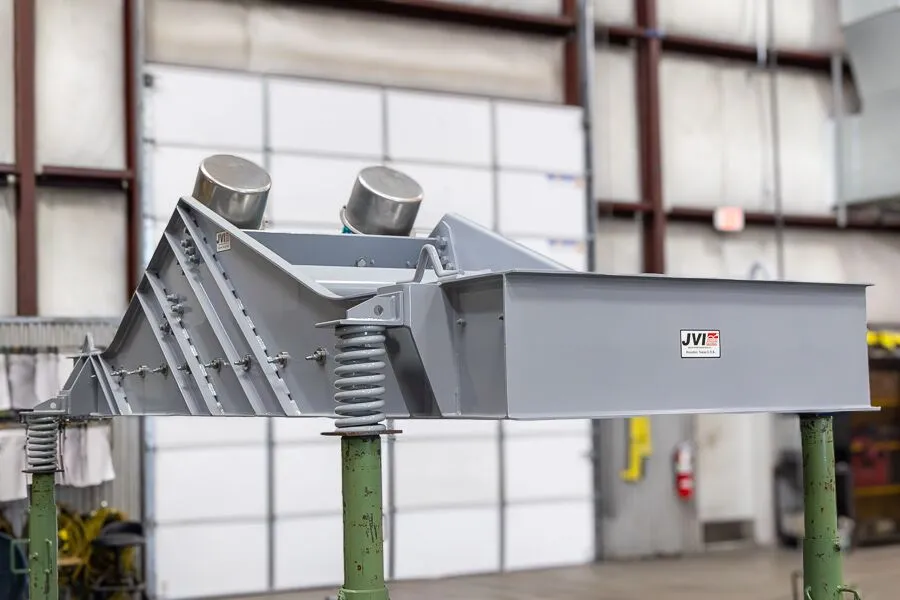
Vibratory scalping screen protects downstream equipment
A JVI customer in the construction industry reached out to replace an aging vibratory screen in one of their manufacturing processes. In this case study we will cover how JVI was able to retrofit a custom vibratory scalping screen into their process, while meeting the required capacity and screening efficiency.
The existing screen was reaching the end of its service life and was becoming less reliable, requiring increased maintenance. The new scalping screen would need to be able to retrofit into the existing available work envelope, accept material from a belt and operate at a capacity of 120 TPH screening +3/8” tramp material from sand with up to a 5.4% moisture content. After reviewing the requirements with the customer, JVI was able to develop a vibratory scalping screen to meet their needs. The screen that JVI proposed included:
Retro Fit to the Available Work Envelope
To ensure an accurate understanding of the work envelope, JVI sent an engineer to perform field measurements. With these measurements and hands-on knowledge of the process, JVI’s engineers designed a scalping screen to fit and operate within the available work envelope of the existing process. The main requirement was to be able to accept the sand from an existing belt conveyor and have the on-spec sand pass through the screen on to another belt conveyor while any tramp material remains as “overs” and outlet into an existing hopper. To meet these requirements JVI engineered the screen to be 50” wide by 168” (128” screen deck) in length. This would allow the screen to fit within the existing work envelope and receive the material and discharge the “thrus” and “overs” to the correct locations.
Scalping Screen Deck
A 3/8” opening, side tensioned deck made of 304 stainless steel was selected. This deck would ensure that the +3/8” tramp material requirement is met, having the on-spec sand pass through easily and any unwanted tramp material discharged as “overs”. To aid in ease of handling and deck changeout, two 50” wide by 64” long woven wire decks were combined to achieve 128” of effective screen length.
Wear Liners
Bolt-on, replaceable 3/8” AR 450 wear liners were added to the inlet and overs discharge areas, as well as plug welded liners on the tops of the cross members located under the screen deck. The addition of wear liners on these areas of the screen will aid in extending the service life.
Electromechanical “Unbalanced” Motors
Dual unbalanced motors were utilized as the drive mechanism. The motors were sized based on the weight of the screen to allow for process optimization through a variable frequency drive.
Single Mass Design
Single mass design utilizes fewer operating components, resulting in high reliability and low maintenance. There are no “tuning” requirements, and the screen can operate through variations in material.
Upon customer review and approval, the scalping screen was manufactured and delivered. The customer elected to have a JVI technician on site during the commissioning of the screen to ensure proper installation, operation, and training personnel on proper maintenance practices. The commissioning of the screen went smoothly, and the scalping screen is now operational and removing unwanted tramp material from their process.